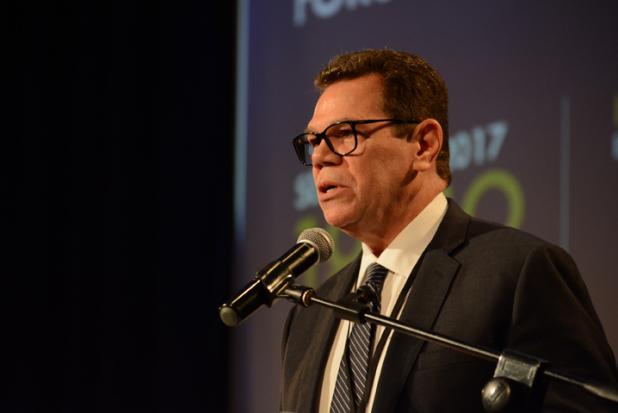
Dr. Warren Smith, President of the Caribbean Development Bank delivering remarks yesterday morning at the Hilton Hotel.
WEAK EXECUTION
Two of the biggest risks to project and programme implementation within the Caribbean are political will and capacity constraints.
That is according to Dr. Warren Smith, President of the Caribbean Development Bank. Smith made the comments as he delivered remarks at the ‘Caribbean Leadership and Transformation Forum: Delivering Results’, which opened yesterday morning at the Hilton Resort, as he reflected on the implementation deficit that exists in the region of which the rate has been as low as 20 per cent in some of the borrowing member countries of the CDB in recent years.
Delving into the topic, Dr. Smith posited the view that the absence of political will, together with an acute shortage of capacity in countries, fittingly explains the high level of inaction which has represented the Caribbean policy reform and implementation experience. With that in mind, he warned that unless the region can come to grips with these two issues, our full participation in the 2030 Development Agenda and the attainment of the Sustainable Development Goals will in fact be in jeopardy.
“We live in times of increasing risk and uncertainty. In these turbulent times, the lack of political will represents a major risk to successful implementation of growth-oriented reform programmes that can transform Caribbean economies. The credibility of many of such programmes has often been undermined by a start and stop approach to decision-making. Decisions to delay or to abandon implementation are frequently influenced by political considerations related to, for example, impending general elections. In these circumstances, there is severe pressure to delay, to modify, or to reverse urgently needed policy reforms,” he lamented.
Dr. Smith added then, that in “these turbulent times”, the ability to drive through a reform programme calls for acquiring buy-in and support from as wide a stakeholder base as possible, including the private sector and civil society. Additionally, he said it requires frequent reporting on performance and feedback from that stakeholder base. As such, he said that from the start, the proposed policy measures should be carefully explained to stakeholders in detail; and during implementation to ensure success, there should be frequent and consistent reporting on results as well as feedback from that same stakeholder base.
However, the CDB President noted that even when there is broad political will for reform, there is still the challenge of a lack of implementation capacity within the state structures.
“Most Caribbean countries allocate sizeable shares of public expenditure to education and training. This has contributed to noteworthy improvements in public sector management across our region. Despite these efforts, nevertheless, insufficiently robust accountability systems result; a weak enforcement culture obtains; and scarce financial resources serve to undermine timely and efficient delivery of Government services. Using the public sector investment programmes as the performance yardstick, it is noteworthy that implementation rates varied from a low of 20 per cent to a high of 75 per cent in select borrowing member countries in recent years, with a noticeable skew, ladies and gentlemen, towards the lower end of this range. That’s bad news,” he stated.
He made the point as he noted that CDB funded projects are also negatively affected by weak execution, which limit the Bank’s own capacity to deliver on its development mandate. Smith explained that post-approval issues including lengthy start-ups, lead to delays in project implementation and low portfolio performance. He added that their inability to “get the funds through the door” in a timely manner, leads to a rapid build-up of undisbursed resources.
His comments came as he said that in 2016, the median time taken between Board approval and loan effectiveness was 348 days, while the disbursement ratio, defined as actual annual disbursement as a percentage of undisbursed balances at the beginning of the year, averaged 17.4 per cent between 2010 and 2016. He added that it is cold comfort to recognise that the relatively poor portfolio performance is not unique to CDB, as donor agencies and other multilateral institutions operating within the region also encounter similar challenges. (JRT)
